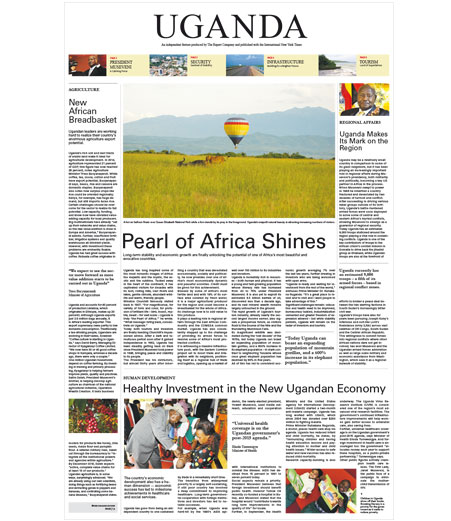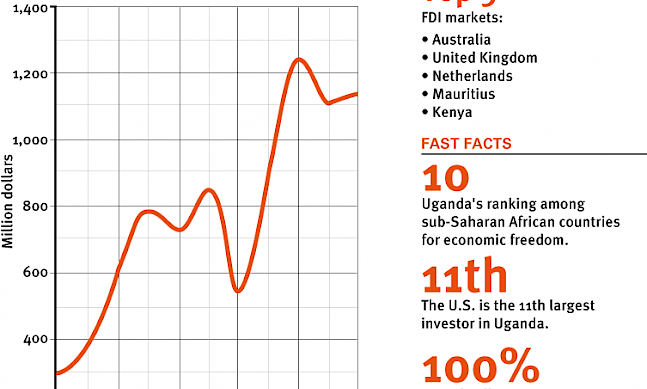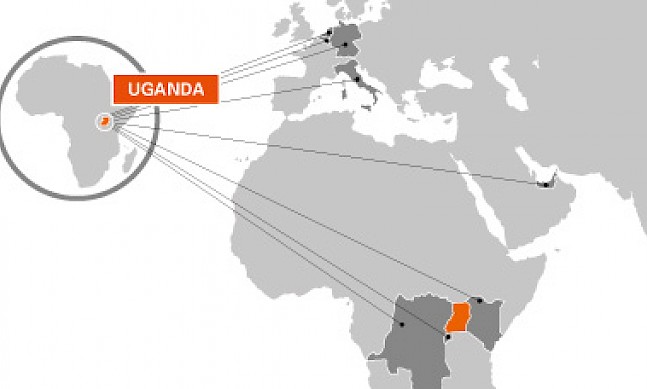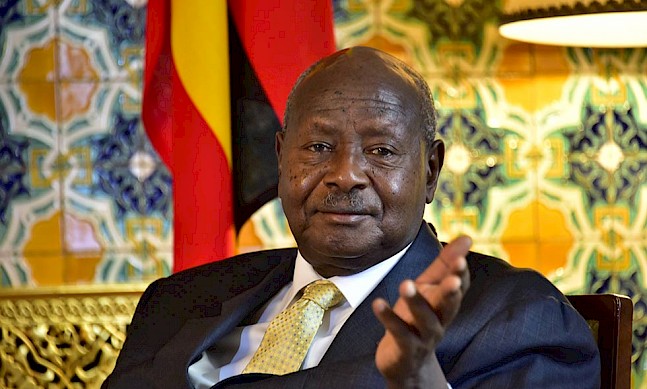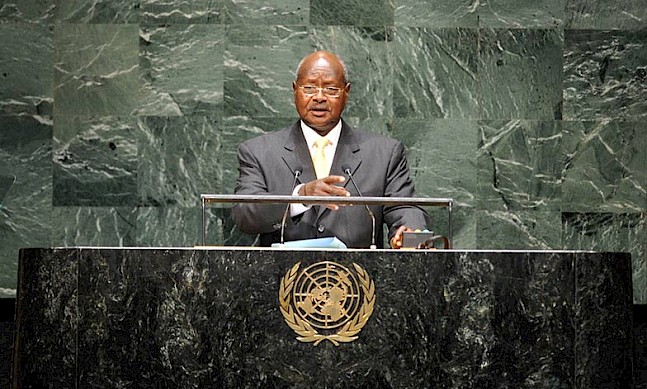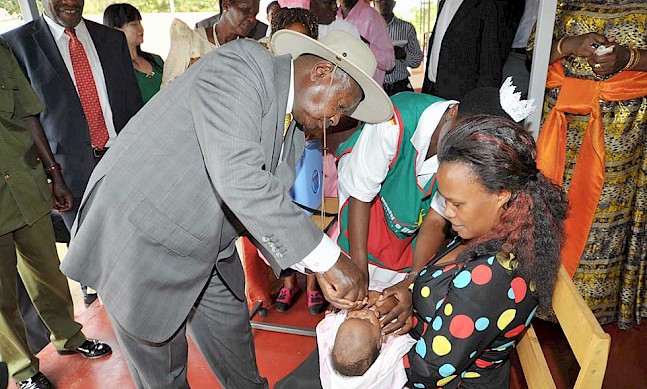As author of the book Why Africa Fails, economist and international business practitioner Elly Twineyo Kamugisha has a pragmatic outlook on what the continent needs to do in order to develop, and the promotion of trade is one of his key recommendations. After taking on the role of executive director of Uganda’s export promotion board in April 2015, he is working to generate wealth and prosperity for the country. The Report Company met with him in Kampala to find out more.
The Report Company: How do you see the role of the Uganda Export Promotion Board (UEPB) in driving the country forward?
Elly Twineyo Kamugisha: I have been to many countries and I know the importance of exports. The Asian tigers and now China are successful because they export. Germany is one of the EU’s most powerful economies because of exports. I joined this organization in April and I am hard at work, with a team, to ensure that UEPB is viewed by its stakeholders – especially the private sector – as a necessary partner in export marketing. My view is that once we have a good strategic plan, we will succeed. The national development plan of Uganda is very good, and our strategic plan is based on it.
I have inherited an organization that has had challenges of leadership and governance. In my view, the government has to continue supporting the private sector and creating a conducive environment for them. We are developing a model of services delivery where my team will work in a similar manner to staff in the private sector. UEPB will have staff with the same level, or more, of knowledge and experts as those staff in the private sector in export marketing. We have to support, with market information, the private sector for them to develop products and commodities and services that are exportable.
Once we have the right export products, then we need to promote them in target markets. There, the approach will be matchmaking, not just attending international trade fairs. I want to go to London and book a hotel ahead of time where I will have invited potential buyers for our products, whether that be fruits and vegetables, hides and skins, or coffee and tea. We will sign letters of intent with them, so that there is the possibility of a commercial relationship. That is what we have to do.
The first biggest market for Uganda now is the regional market, mainly the neighboring countries. We have had the challenge of South Sudan’s political troubles, and it was the single biggest market for Ugandan products. I have to state that exports are zero rated, which means there are no taxes to pay as you cross the borders. An exporter need only to show evidence that these goods were actually exported. This is an incentive, especially as we are landlocked.
TRC: What challenges do you see in exporting to developed markets?
ETK: Our second major market is the EU, and with the EU, quality has not been a problem because we are basically exporting primary products. Essentially, primary products don’t have very difficult quality issues because they are in their primary form. A banana is a banana.
Recently, we have had a small challenge with capsicum exports because of the false codling moth. We are working on that. It is not only a problem in Uganda, they have the same problem in California and in Ghana, but I don’t care where else they have the problem, we have to be better.
The EU is still intercepting some consignments and destroying them or taking them for testing. We self-imposed an export ban for a month to clean up our exports in terms of compliance and traceability. Those who are doing a good job, who are many, cannot be made to suffer because of these few. More than 80 percent of the exporting firms to the EU have been found to be in compliance. I am an economist and also a graduate of international business, so I believe in the importance of image and brand. You have to have a good brand and this is all about perception. I continue to say, however, that we cannot continue exporting simply primary products.
“We have to support, with market information, the private sector for them to develop products and commodities and services that are exportable.”Post This
TRC: What needs to be done to increase the visibility of Uganda’s brand?
ETK: The government has to promote Uganda, not just the exports but tourism and foreign direct investment. I am not a supporter of aid. I think the best way is for Uganda to produce products that are marketable and sell them and get foreign exchange. The president has been saying this, and I believe in and support him. We have to support exports because if we don’t increase trade, we will have to depend on aid, with all the conditionalities that come along with it.
Agriculture still is important for Uganda even if we still export primary products, “because the market is there. However, we need to add value to agricultural commodities.
Tourism is also very important for economic growth. If we promote tourism, the visitors who come to see the mountain gorillas and the national parks will buy from us in the future, or they will want to come and invest here.
Countries in the region such as Kenya and Rwanda have invested in the marketing of their countries, in exports and tourism and so on. Look at Kenya. In 2015, the budget of Kenya’s tourism promotion agency was more than 10 times more than that of the Ugandan tourism promotion agency. Because of this investment in marketing, their message is coming up very well and they are being perceived very positively.
TRC: What is your current focus in boosting Uganda’s exports?
ETK: To begin with, we want to increase the sale of value-added products. For a long time, our market has been dominated by Kenya. The East African Community is a big market of more than 140 million people, but a market is not a market until these people have purchasing power. We think we can sell manufactured products to northern Tanzania, which is very far from Dar es Salaam. We can sell products to western Kenya, whose people are from the same community as Ugandan people. The same goes for the people on the border with Rwanda. We are the same people with the same cultures and customs. The same is the case with the eastern DRC.
We will still continue to promote the traditional exports of coffee, tea and cotton.
One of the reasons for this organization’s existence is the promotion of non-traditional exports – commodities or services. In 1992, we had the first flower farm in Uganda, which registered its first flower exports in 1993, and flowers are now one of the first three non-traditional exports. We encourage fish farming and aquiculture, so we can increase the catch and the quantities. We have now more than five companies producing packed milk. There is another farm which is now selling poultry to the region.
Because Ugandans speak very good English, we can go into business process outsourcing (BPOs) and call centers. We are very bright people and our universities are very good.
“I am not a supporter of aid. I think the best way is for Uganda to produce products that are marketable and sell them and get foreign exchange. If we don’t increase trade, we will have to depend on aid, with all the conditionalities that come along with it.”Post This
TRC: What is your current focus in boosting Uganda’s exports?
ETK: To begin with, we want to increase the sale of value-added products. For a long time, our market has been dominated by Kenya. The East African Community is a big market of more than 140 million people, but a market is not a market until these people have purchasing power. We think we can sell manufactured products to northern Tanzania, which is very far from Dar es Salaam. We can sell products to western Kenya, whose people are from the same community as Ugandan people. The same goes for the people on the border with Rwanda. We are the same people with the same cultures and customs. The same is the case with the eastern DRC.
We will still continue to promote the traditional exports of coffee, tea and cotton.
One of the reasons for this organization’s existence is the promotion of non-traditional exports – commodities or services. In 1992, we had the first flower farm in Uganda, which registered its first flower exports in 1993, and flowers are now one of the first three non-traditional exports. We encourage fish farming and aquiculture, so we can increase the catch and the quantities. We have now more than five companies producing packed milk. There is another farm which is now selling poultry to the region.
Because Ugandans speak very good English, we can go into business process outsourcing (BPOs) and call centers. We are very bright people and our universities are very good.



